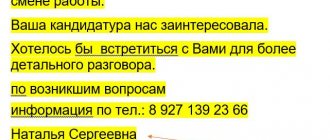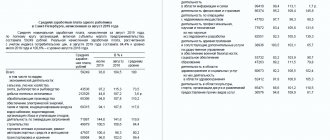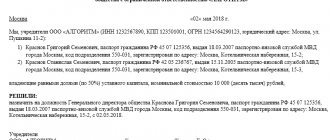What is certification and why is it carried out?
First of all, let's talk about the purpose of certification of municipal employees. According to paragraph 1 of Art. 18 Federal Law No. 25 “On Municipal Service in the Russian Federation”, certification of an employee is carried out in order to determine his suitability for the position held. The event takes place once every 3 years and is a test of the qualifications and performance of a civil servant. During it the following are assessed:
- employee knowledge;
- his professional skills;
- experience and quality of work;
- performance efficiency;
- achieving goals and specific results, etc.
As a result of the certification, conclusions can be drawn about the employee’s suitability or inadequacy for the position held.
https://youtu.be/b0r4_U7-hS4
Why is certification needed?
The exam is critical for the employer because:
- is a way to determine the level of qualifications of an employee;
- allows for optimal redistribution of workers among areas of activity;
- increases the efficiency and effectiveness of work, responsibility for the assignment;
- makes it possible to establish the fact of suitability for the position held and to form a highly qualified team;
- identifies the most effective employees;
- determines the need for advanced training and opportunities for career advancement;
- encourages employees to develop themselves and improve their professional level.
Who doesn't pass the test?
It is worth noting that the following categories of persons are not subject to verification:
- municipal service positions held for less than one year;
- have reached the age of 60 years;
- pregnant women;
- employees on maternity leave or parental leave until the child reaches the age of three years. They can undergo inspection no earlier than one year after leaving leave;
- workers on the basis of a fixed-term employment contract.
Preparatory activities
On the Internet you can find information about how the certification of municipal employees is carried out using the example of the administration of a particular district. In our article we will tell you about the procedure for holding this event. Let us immediately make a reservation that according to Part 6 of Article 18 of the Federal Law “On Municipal Service”, the Regulations on conducting certification are approved by a municipal legal act in accordance with the standard regulations on conducting an audit, which is approved by the law of the subject of the Russian Federation (for example, Appendix No. 3 to the Law of St. Petersburg dated 02/15/2000 No. 53-8 (as amended on 01/30/2018) “On the regulation of certain issues of municipal service in St. Petersburg” (adopted by the Legislative Assembly of St. Petersburg on 02/02/2000)), the provisions of which must also take into account the system of qualification requirements established by the legal act.
First of all, the head of the organization carries out explanatory work with the staff, during which he explains to the employees the need for certification and the procedure for its implementation. He also generates a list of persons who will participate in the inspection.
The employer's order sets the deadlines for certification, approves the list of municipal employees subject to inspection, as well as the schedule for its implementation.
This information is communicated to each person being certified against signature no later than two months before the start of the event.
No later than one month before the date of its conduct, the employee’s immediate supervisor sends a review to the certification commission, in which he evaluates the employee’s performance.
At least two weeks before the day of the inspection, the employee must be familiarized with the feedback that the manager gave to him. And, if he considers it necessary, he can independently provide the commission with additional information about his official activities, which, in his opinion, is important.
How is certification of municipal employees carried out?
Certification of municipal employees questions and answers 2020
The procedure is defined by Federal Law No. 25-FZ of March 2, 2007 “On Municipal Service in the Russian Federation” (Article 18) and is an important element in the structure of developing professional knowledge and management skills among government employees. Let us consider in the article the purpose of certification of municipal employees, who should undergo it, what the results may be, as well as the consequences of failure to attend the event.
Why is certification needed?
The exam is critical for the employer because:
- is a way to determine the level of qualifications of an employee;
- allows for optimal redistribution of workers among areas of activity;
- increases the efficiency and effectiveness of work, responsibility for the assignment;
- makes it possible to establish the fact of suitability for the position held and to form a highly qualified team;
- identifies the most effective employees;
- determines the need for advanced training and opportunities for career advancement;
- encourages employees to develop themselves and improve their professional level.
Who should be certified and who should not?
The procedure must be carried out by the employer at strict intervals - once every three years. Cases of conducting an extraordinary inspection are not established by the legislation on municipal service.
The employer does not have the right to assign certification to the following categories of employees:
- have worked in the position for less than a year;
- who have reached 60 years of age;
- pregnant employees;
- women who are on maternity leave or parental leave until the child reaches the age of three years. They are subject to inspection one year after the end of this vacation;
- employees on a fixed-term employment agreement (contract).
How is certification carried out?
Certification of municipal employees (using the example of the administration of the Moscow region) consists of a set of specific steps.
Step 1. The law of the constituent entity of the Russian Federation approves a standard provision on conducting an inspection.
Step 2. The procedure must be approved by the administration of the locality on the basis of the law.
Step 3. The head of the administration issues an administrative act, which provides for the following provisions:
- on the formation of the certification commission and its composition;
- about the schedule of the event, which must be brought to the attention of the person being certified at least a month before the event;
- on the composition of employees subject to certification;
- on the preparation of documents that are necessary for the work of the certification commission.
Step 4. No later than two weeks before the start of the event, the following must be sent to the commission:
- job description for the relevant position;
- review of a municipal employee subject to certification (the sample document and its form are not strictly established);
- certification sheet with data from the previous inspection.
Step 5. No later than a week in advance, the HR department must familiarize the employee with the submitted review. The employee has the right, before the day of the procedure, to provide additional information about his activities or to send a disagreement with the review.
Step 6. The procedure is carried out in person in the presence of at least 2/3 of the members of the certification commission. The commission reviews the available documents, hears the employee’s report on solving the tasks assigned to him, and, if necessary, hears from his immediate supervisor. Certification of municipal employees (questions and answers for 2020 are compiled according to certain requirements) can be carried out using test questions, recommendations for the preparation of which can be found on the official website of the Ministry of Labor.
Step 7. Based on the results of the certification, the commission, in the absence of the employee, decides whether he is suitable for the position being filled or not. The decision is formalized in a certification sheet, which is signed by the members of the commission and the employee being certified.
The commission may recommend encouraging the employee, including promotion, sending him to receive additional professional education, and also recommend increasing the efficiency of his activities.
Step 8. The result of the certification is announced to the employee immediately after the voting results are summed up.
The progress of the event is recorded in the minutes, which are kept by the secretary of the commission. The protocol must be signed by the members of the commission.
The materials are transferred to the employer. Based on the results, the employer decides whether the person is suitable for the position held or not, the commission can also decide on:
- employee incentives;
- demoting an employee with his consent within a period of no more than one month from the date of inspection. The employer's decision is formalized by order.
What happens if you don’t show up for certification?
The procedure is carried out in the presence of the person being certified. If an employee fails to attend a meeting of the certification commission without good reason, the commission may conduct an inspection in his absence or postpone it to another date.
What happens if you are found unsuitable for your position?
The conclusion of the certification commission about the inadequacy of the position held allows the employer's representative to terminate the employment contract with the employee. In accordance with paragraph 14 of Art. 81 of the Labor Code of the Russian Federation, this option of dismissal is allowed if it is not possible to transfer the employee with his written consent to another available job.
If it is decided to dismiss, the employer's actions are as follows:
1. Issue an order signed by the manager with a decision based on the results of the certification, familiarize all interested parties with the order, as well as the employees mentioned in this order.
2. Offer to the employee recognized as unsuitable for the position held all available vacancies in the organization in the given area. The proposal must be made in writing.
3. If the employee agrees, issue an order to transfer him to another position using the unified form No. T-5.
4. If the subordinate refuses the transfer, terminate the contract with him on the basis provided for in clause 3, part 1, art. 81 of the Labor Code of the Russian Federation, issuing an order in a unified form No. T-8.
5. When making a decision to dismiss an employee who is a member of a trade union organization, the employer is obliged to request a reasoned opinion from the elected body of the primary trade union organization. The employer's representative terminates the contract no later than one month from the date of receipt of the reasoned opinion of the elected body of the primary trade union organization. The calculation of the period does not include periods of temporary incapacity for work, being on vacation and other periods of absence of the employee when the position is retained.
6. A record of dismissal is made in the work book due to the employee’s inadequacy for the position held or the work performed due to insufficient qualifications, confirmed by certification results.
Documents for certification
Documents that must be submitted to the certification commission include:
- a motivated review of a municipal employee subject to certification, a sample of which contains the opinion of the immediate supervisor;
- information on completed instructions and prepared draft documents for the specified period, contained in the annual reports on the professional performance of the employee;
- an explanatory note from a civil servant regarding the feedback from the immediate supervisor (statement of disagreement with the submitted feedback);
- certification sheet with data from the previous inspection.
How to get certified
The audit is carried out at a meeting of the certification commission in the presence of the person being certified.
The event begins with a report from the chairman of the commission. Members of the certification commission discuss the materials provided and ask the person being certified questions in order to more fully identify his professional and business qualities.
Based on the information received during voting, the commission makes a decision by a simple majority of votes. It might sound like this:
- corresponds to the position held in the municipal service;
- does not correspond to the position held in the municipal service.
In case of equality of votes, the employee is recognized as corresponding to the position held.
The results of the inspection are reflected in the certification sheet of the municipal employee, which the person being certified must be familiarized with and signed. The completed document is signed by the members of the certification commission.
Next, the certification sheet, no later than seven days after the inspection, is provided to the head of the city government body, by whose order the commission was formed. After he makes a decision based on the results of the inspection, the certification sheet is transferred to the personnel service and, together with the review, is placed in the employee’s personal file for storage.
The meeting of the certification commission is recorded. The minutes indicate information about the course of the meeting and the decisions made. The completed document is signed by the chairman and secretary of the commission. An annex is prepared for it, which includes all the documents and materials provided for the certification of municipal employees. After this, the protocol is transferred for storage to the personnel department of the city government.
Certification of municipal employees
Certification of municipal employees is a personnel event during which the employer and state control authorities learn about the level of training of specialists working in these positions and what needs to be done to improve the quality of work of all employees. Certification of municipal employees is a serious and complex process; in order to carry it out, it is necessary to comply with many requirements specified in the relevant legislative acts.
Certification of employees of municipal institutions
The procedure governing the certification of employees of municipal institutions is specified and regulated in legislation using Art. 18 of Federal Law No. 25-FZ of 03/02/2007. It says that the certification of a municipal employee is carried out in order to determine whether the employee is suitable for the position in which he works.
It is worth noting that such a knowledge test is not required for everyone. Categories of workers who do not have to undergo certification are as follows:
- Employees who have been working in this position for less than 1 year;
- Employees of a municipal institution who have reached the age of 60;
- Pregnant employees;
- Those who are on maternity leave or to care for a child who has not yet reached the age of three;
- An employee who fills one of the municipal positions temporarily, on the basis of a fixed-term employment contract.
Certification of a municipal employee and testing to test skills, like any similar assessment of knowledge, begins with a normative document - an order. It is issued by the manager and the document must contain basic information. The procedure for forming the certification commission must be approved there. Also, to conduct an inspection, it is necessary to indicate in the order the schedule according to which the testing will take place. In addition, the order must indicate a list of employees who must undergo certification and inform them that preparation for the said procedure has begun.
Also, the employer’s order approves such an important thing as the composition of the certification commission. There are certain norms that dictate who should enter there. In the standard version, the certification commission consists of representatives of the head of the enterprise, an employee from the legal or legal department and personnel officers. The following positions are formed from them:
- An employee acting as chairman of the certification commission. He is responsible for making the final decision and resolving complex issues.
- An employee acting as deputy chairman of the certification commission.
- Secretary of the certification commission. He is responsible for ensuring that the document flow of the entire audit is in perfect order. The employees of the enterprise give their reports to him.
- Ordinary members of the commission who are responsible for ensuring that decisions made at meetings are objective and independent.
But in some cases, other specialists may also join the certification commission. For example, deputies and representatives of municipal bodies, employees of government bodies, as well as independent specialists suitable for solving difficult situations. Their presence in the certification commission is possible only with mutual agreement between them and the employer who conducts this check.
In order for the certification schedule to provide employees with all the necessary information, the following must be indicated:
- Full name of the structural or territorial unit where the certification will be carried out;
- A list that will include all employees of a municipal institution who will have to pass a knowledge test;
- The exact date and time of the certification. It is also necessary to indicate the place where the commission meetings will be held.
- The period during which all employees are required to collect the necessary documents and submit them to the commission. At the same point, management notes the heads of departments responsible for collecting reports.
After the schedule is approved and the order is issued, each employee who must undergo certification must receive notification of this. And no less than a month before the start of the inspection. If this condition is violated, this may become the reason for a labor dispute or even legal proceedings.
Direct supervisors of employees who will undergo certification must provide their feedback on these employees. These documents must be sent to the secretary no later than two weeks before the start of the commission meetings. The review must contain detailed information about the employee.
- The position held by the employee being assessed and the date on which he received appointment to this place of work;
- A list of those documents and projects in the development of which the employee undergoing certification took an active part;
- Overall assessment of the employee. The employee’s direct supervisor must evaluate his personal qualities, as well as the results of his work activity.
Also, the employee’s supervisor must attach to the review precise information about what municipal assignments this employee has completed and is performing. And if the employee has already been certified, then the results of a previous assessment of his skills must be attached to the review.
After the review reaches the certification commission, HR employees are required to familiarize the relevant employee with its text. And the municipal employee has every right to send additional information that was not taken into account in the original text of the document. He can also report that he considers the review to be completely untrue and the employee does not agree with it. In this case, you need to explain the essence of the problem to the HR representative and write a memo to the manager, where you need to point out the inaccuracies and distortions.
In addition to all of the above, orders for the municipal unit, information about its position and job descriptions of the person being tested must be delivered to the certification commission.
The procedure for certification of municipal employees
The schedule has been approved, notifications have been received, reports have been collected. Now the meetings of the certification commission begin. But its meetings gain legitimacy only if the turnout of at least two-thirds of its total membership is ensured. If fewer people are present at the meeting, then all decisions made in this composition will be illegitimate.
Certification must be carried out in the presence of the person whom it, in fact, evaluates. But if a municipal employee did not appear at the meeting without a good reason, or even refused to test his knowledge, then the commission should be postponed.
During certification, the commission analyzes the documents received, as well as interviews with the employees being inspected. At these meetings, an employee of a municipal institution must talk about his work activities. But if such a need arises, the commission has every right to invite the employee’s direct supervisor to the meeting.
Separately, it is worth mentioning the principles on which the commission’s assessment of the professional activities of municipal employees is based. During certification, specialists pay attention to such points as the employee’s compliance with the qualification requirements that are put forward for this position. The commission also pays close attention to the employee’s share of participation in solving the tasks assigned to his department. An important factor will be the complexity of the work that the municipal worker performs and how effectively he performs it.
The certification commission makes a decision independently; this does not require the presence of the employee being assessed at the meeting. Experts conducting knowledge and skills testing decide what the qualifications of each of the interviewed employees are by regular voting. Whichever proposal receives the majority of votes is accepted. In rare cases, when nothing can be decided by voting, an employee of a municipal institution is recognized as meeting the criteria that are put forward for his position.
Decisions based on inspection results
Based on the results of the inspection, all employees are divided into two groups:
- Those employees who meet the criteria for their position;
- Those employees who do not meet these criteria;
It is also worth noting that the certification commission has the right to make recommendations regarding certain employees. Experts may note that some employees should be rewarded for outstanding achievements in their work activities. They can also advise promoting an employee up the career ladder, because he is distinguished not only by his work achievements, but also by his excellent knowledge. And the certification commission can also give recommendations on how to improve the overall level of labor efficiency at the enterprise. This may concern both the advanced training of individual employees and general activities that need to be carried out in production.
The results obtained from the certification are communicated to employees immediately after the specialists finish voting on all issues. The summed up results are entered into a special card and signed by all members of the commission, after which the municipal employee is introduced to its contents. The received certification sheet will be stored in the employee’s personal file.
After the employer receives the results of the certification, he has a month to take any action regarding individual employees of his company. This applies to both rewards for a good level of quality of work and punishments - demotions, transfers.
It is worth noting that if an employee does not agree to a reduction, and there is no vacancy for his transfer, then the employer can fire the person due to non-compliance with the criteria for the position. But if in one month the head of the enterprise does not fire or demote the employee, then later he will no longer be able to use the results of the certification to do this.
But if an employee does not agree with the results of the certification, or with the decision made, he can start a labor dispute. This event is carried out in the usual manner - in the order established by the legislation of the Russian Federation. And if, as a result of the proceedings, the parties do not come to an agreement, then the employee has the opportunity to apply to the court for a solution to the situation.
The result of the trial may be the reinstatement of the employee to his position. The judge may also determine that the person's employer will have to reimburse the employee for part of the wages. The reason for such a decision may be any mistake made during the certification of a person. Therefore, the employer needs to carefully ensure that the entire procedure is carried out as specified in the relevant Regulations.









